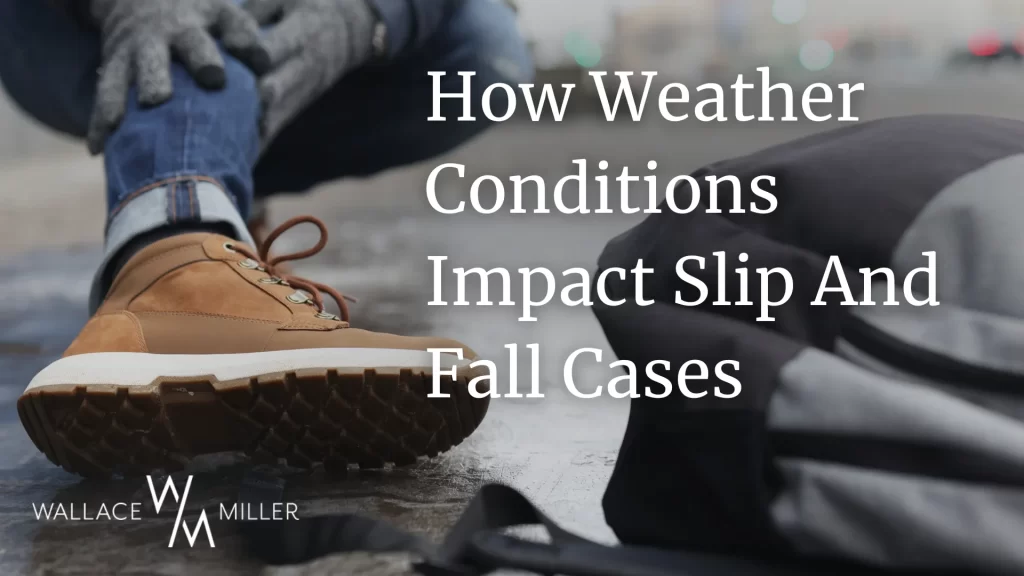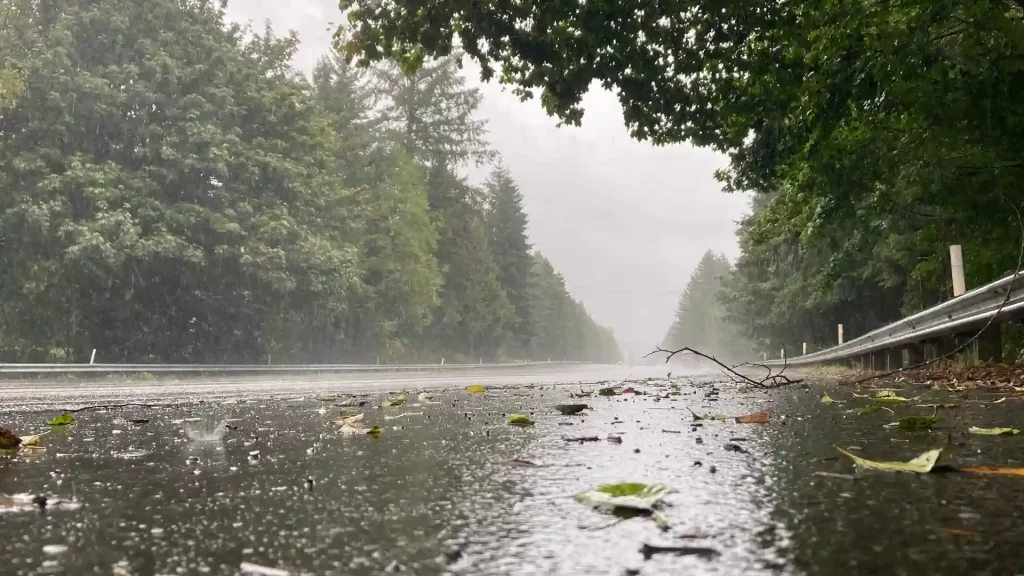Posted on Sunday, February 4th, 2024 at 5:39 pm

Slip and fall accidents can happen at any time, but adverse weather conditions such as rain, snow, and ice can significantly increase the risk of these incidents. When a slip and fall accident occurs during inclement weather, determining liability and proving negligence can become more complex. Property owners have specific duties to maintain safe premises, even in challenging weather conditions, and understanding these obligations is crucial for protecting your rights if you’ve been injured in a weather-related fall.
Weather-Related Accidents and Slip and Fall Risks
Inclement weather can create a variety of hazardous conditions that contribute to slip and fall accidents, such as:
- Wet or slippery floors: Rain, snow, and ice can be tracked inside buildings, creating slippery surfaces that increase the risk of falls.
- Icy sidewalks and parking lots: Freezing temperatures can cause ice to accumulate on outdoor walkways and parking areas, making them treacherous for pedestrians.
- Reduced visibility: Heavy rain, fog, or snow can obscure hazards and make it more difficult for people to navigate safely.
- Hidden dangers: Snow and leaves can conceal uneven surfaces, potholes, or other tripping hazards, leading to unexpected falls.
These weather-related risks can affect various properties, from commercial buildings and retail stores to apartment complexes and private residences.
Property Owner Duties in Adverse Weather Conditions
In Illinois, property owners have a legal obligation to maintain reasonably safe premises for visitors, even during inclement weather. This duty includes taking appropriate measures to address weather-related hazards and minimize the risk of slip and fall accidents. Some specific responsibilities may include:
- Regularly inspecting the property for weather-related hazards, such as snow, ice, or standing water.
- Promptly removing snow and ice from sidewalks, parking lots, and other common areas.
- Placing mats or rugs at building entrances to minimize the amount of water tracked inside.
- Placing wet floor signs or other warnings to alert visitors of slippery surfaces.
- Ensuring proper lighting and visibility in outdoor areas to help people navigate safely during adverse weather.
The extent of a property owner’s duty may vary depending on the specific circumstances, such as the severity of the weather and the resources available to address hazards. However, failing to take reasonable steps to mitigate weather-related risks can constitute negligence and make the property owner liable for resulting injuries.
Slip and Fall Claims During Bad Weather
If you’ve been injured in a weather-related slip and fall accident, you may be entitled to compensation for your medical expenses, lost wages, pain and suffering, and other damages. To succeed in a slip and fall claim, you’ll typically need to prove that:
- The property owner owed you a duty of care based on your status as a visitor (invitee, licensee, or trespasser).
- The property owner breached that duty by failing to take reasonable measures to address weather-related hazards.
- The breach of duty directly caused your slip and fall accident and resulting injuries.
- You suffered actual damages as a result of the accident.
Proving negligence in weather-related falls can be challenging, as property owners may argue that the hazardous conditions were open and obvious or that they took reasonable steps to address them. An experienced slip and fall attorney can help you gather evidence and build a strong case to counter these defenses.
Proving Negligence in Weather-Related Falls
To establish property owner negligence in a weather-related slip and fall case, you’ll need to present evidence that demonstrates the owner’s failure to take reasonable precautions. Some key types of evidence may include:
- Photographs or videos of the hazardous conditions, such as uncleared snow or ice, standing water, or inadequate lighting.
- Witness statements describing the dangerous condition and the property owner’s response (or lack thereof).
- Weather reports or data showing the duration and severity of the inclement weather.
- Property maintenance records revealing a lack of regular inspections or inadequate snow and ice removal practices.
- Medical records and expert testimony linking your injuries to the slip and fall accident.
- Evidence of prior accidents or complaints related to weather hazards on the property.
By gathering compelling evidence and working with an experienced attorney, you can build a strong case for property owner negligence and improve your chances of securing fair compensation for your injuries.
Wet Weather Safety Tips
 While property owners have a duty to maintain safe premises during inclement weather, there are also steps you can take to reduce your risk of weather-related slip and fall accidents:
While property owners have a duty to maintain safe premises during inclement weather, there are also steps you can take to reduce your risk of weather-related slip and fall accidents:
- Wear appropriate footwear with good traction, especially when navigating wet or icy surfaces.
- Take your time and walk slowly, paying attention to your surroundings and any potential hazards.
- Use handrails or other stable supports when ascending or descending stairs.
- Avoid carrying large or unwieldy items that can obstruct your vision or throw off your balance.
- Report any hazardous conditions or inadequate maintenance to the property owner or manager promptly.
By exercising caution and staying alert, you can minimize your risk of weather-related falls and protect your well-being.
Get Help After a Slip and Fall Accident
Slip and fall accidents during inclement weather can result in serious injuries and complex legal challenges. If you’ve been hurt in a weather-related fall on someone else’s property, it’s essential to understand your rights and the property owner’s obligations.
The knowledgeable attorneys at Wallace Miller have extensive experience handling slip and fall cases in Chicago, including those involving adverse weather conditions. Contact us at (312) 261-6193 for a free consultation and let us help you navigate the legal process and fight for the compensation you deserve.
